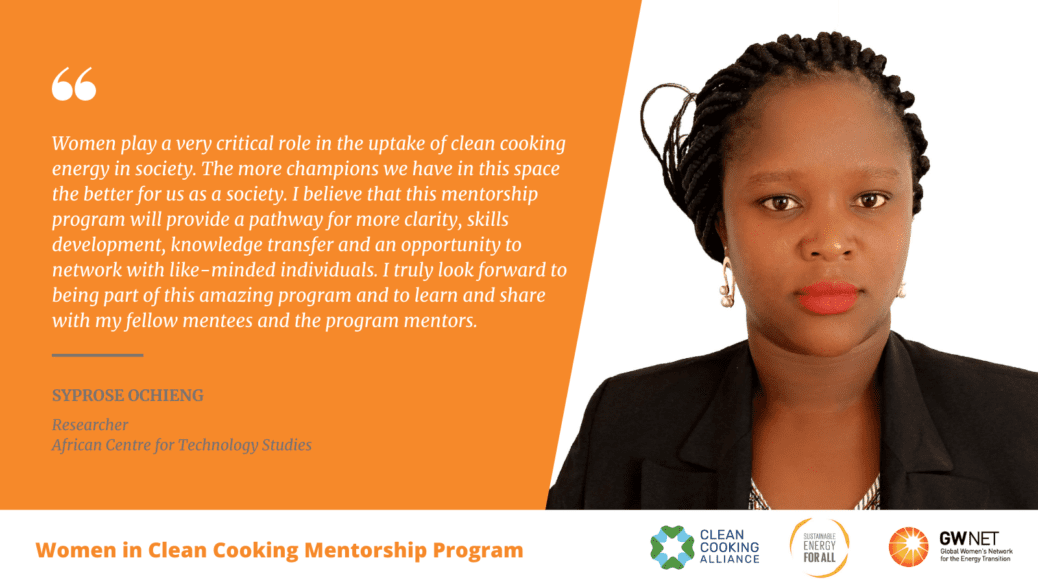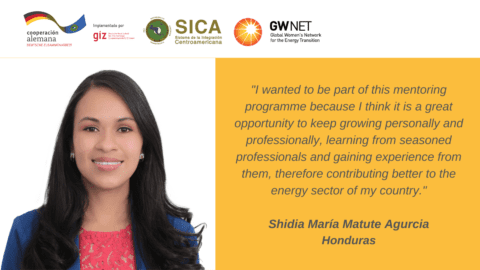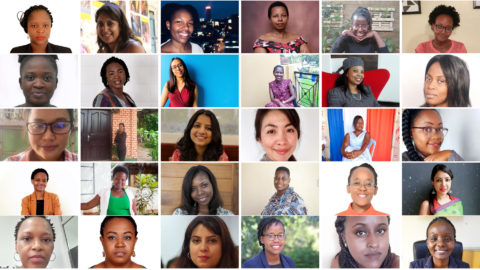GWNET brings you the 13th instalment of the “Meet the Women in Clean Cooking” series which celebrates the work and achievements of the women who are part of the Clean Cooking Mentorship Program. This program is made up of 30 mentee-mentor tandems, with mentees from over 15 countries. Meet Clean Cooking mentee, Syprose Ochieng, a Researcher at the African Centre for Technology Studies in Kenya.
1) Tell us a little about yourself. What do you love most about what you do?
I am a social researcher and social equity enthusiast. My background in social sciences (mainly in community development and international studies) has enormously shaped my philosophy of “Thinking Global and Acting Local”.
This academic background has enabled me to look at challenges that face our communities and think critically of how best to offer solutions. I am currently a Research Assistant at the African Centre for Technology Studies working under the Modern Energy Cooking Services Program.
What I love most about my work is the impact it has on communities, and the influence it has on policies. Through research, we are influencing behavioural change in society while solving the existential challenge of climate change, through advocating for modern clean and efficient cooking energy that leaves a very small carbon footprint. This is while ensuring that there is social and economic growth for our women at the grassroots.
2) What were your goals when you started working in clean cooking? How have these evolved?
I grew up in a household where the use of biomass fuel was the only thing we knew and electricity was only for lighting. Years later, working as a researcher in clean cooking, I have been surprised by how much information is out there on clean cooking and a lot has been demystified.
My goal was to first learn the concepts of modern clean cooking energy and to get an in-depth understanding. As I continued to explore clean cooking, a lot of misconceptions I had growing up – and that I believe most of my community still believes in – have been demystified. The perception that clean cooking is costly and unrealistic needs to be debunked completely through community sensitization and awareness creation but also through real-life experiments such as the cooking diaries initiative which I have been a part of together with my colleagues at the African Centre for Technology Studies. This could be replicated in rural and semi-urban communities.
3) What are the opportunities for clean cooking in your country?
In Kenya, we have over 57.4% of the population living in informal settlements. The majority of households in an informal settlement still use biomass fuels for cooking. However, as a country, our need for adoption for clean cooking has increased over the years. Kenya has pledged to the foremost global energy ventures that have provided us with strategic prospects to drive a clean cooking agenda. The government’s initiatives around electrification and renewable energy create a favourable environment for conversations around the transition from conventional cooking practices to modern clean cooking.
The conversations around clean cooking are not a new phenomenon, however, the adoption of clean cooking is slower due to various factors (affordability, accessibility, and connectivity etc.) Despite the impeding factors, the mood has been set for the transition by initiatives such as the Modern Energy Cooking Services program, Clean Cooking Alliance (CCA), Sustainable Energy for All (SEforALL) and the Global Women’s Network for the Energy Transition (GWNET). Locally we have the Improved Stoves Association of Kenya, Clean Cooking Association of Kenya, BURN, SCODE among many others.
Being relatively new in the energy sector, I struggled to find a niche because it seemed like women or men around me in the energy sector had gone far ahead and it was really hard to “catch up”. However, my interest is what pushed me to seek for mentorship opportunities in this sector and to be open to sit in the learner’s seat and just learn. This program will certainly support this.
In five years, I would like to have a very clear career trajectory and be well equipped with knowledge and skills that will enable me to support fellow women in the energy sector and more specifically women in communities through knowledge sharing. This mentorship program has already offered a platform where knowledge transfer will take place.
6) What advice would you give to women hoping to join the clean cooking sector?
Just join! Who is better placed to tell your story?
Read more about GWNET’s mentoring programmes here.











